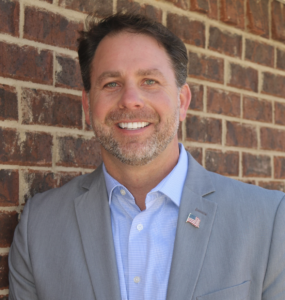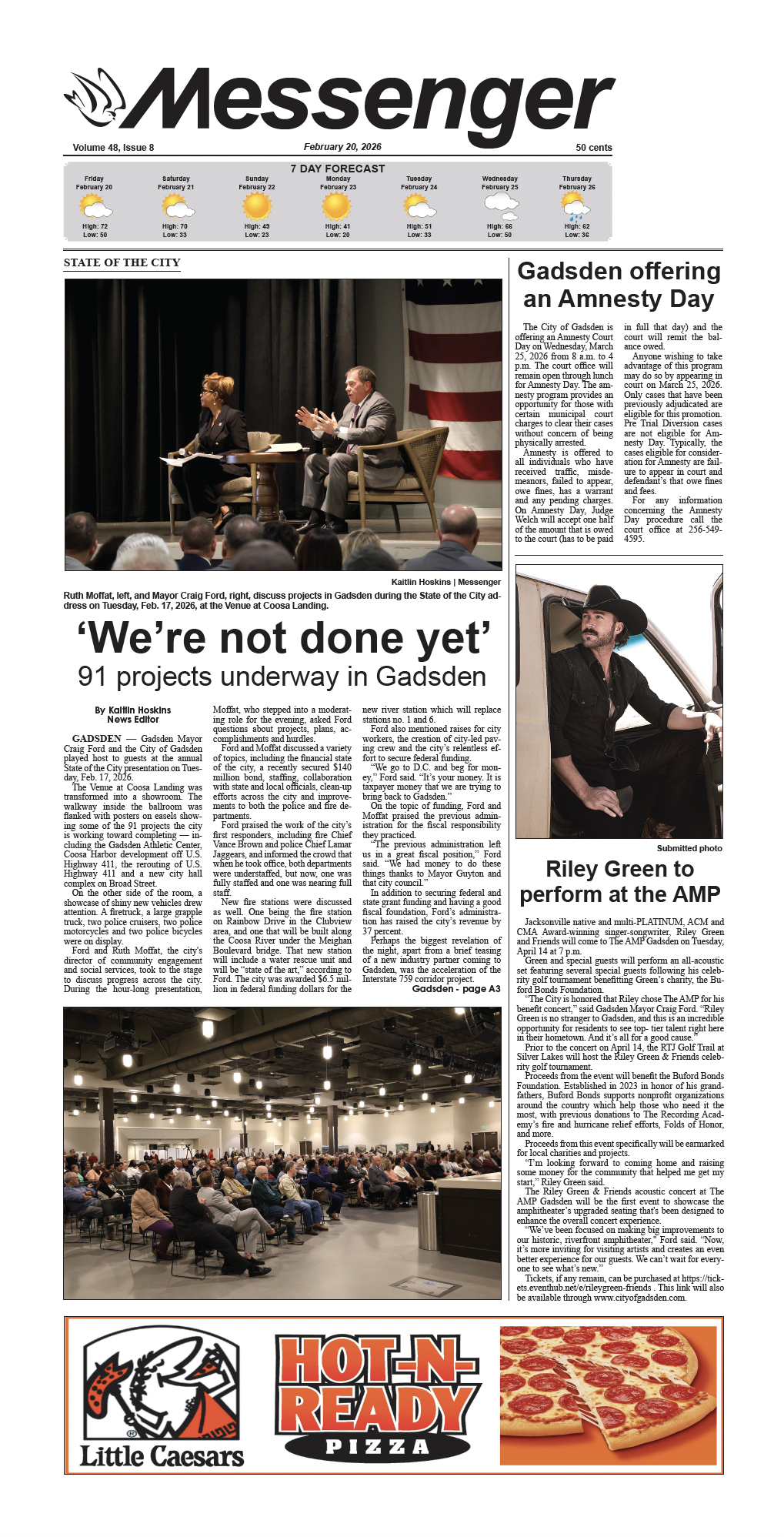By Katie Bohannon, News Editor
While Etowah County voters turned to the polls last Tuesday, May 24, the news of a redistricting error impacting ballots soon intermingled with primary results, leaving candidates and residents left questioning its effect on the election.
According to a joint statement released by the offices of the Secretary of State and Etowah County Probate Judge, the discrepancy first arose in April, when a candidate’s family member attempted to cast an absentee ballot, only to discover the candidate she supported did not appear on her ballot. This error follows the decennial census, after which the Alabama Legislature is required to draft new legislative districts, with the Board of Registrars assigning voters to their correct districts according to the new maps.
Though measures were taken to resolve the initial issue, during the May 24 Primary Election, it was discovered the problem was not corrected – resulting in voters receiving the incorrect ballots for their respective districts – and negatively impacting voters and candidates in Alabama House of Representatives Districts 28 and 29 and potentially Etowah County Commission Districts 4 and 5.
On Tuesday, May 31, Republican and Democratic party leaders will decide whether or not to certify the current electoral results. Prior to the decision, the voting tally for all races will be finalized and the parties will assess how many votes were influenced by the error. No updates or exact numbers are currently available on how many voters or voting areas were affected, but both parties witnessed the impact of the discrepancy.
“There are a lot of questions [about the redistricting error],” said Etowah County Democratic Party Chairman Charles Abney. “Both the republicans and democrats were affected. Right now, all we have is an unofficial vote count. At this point, no decision has been made.”
Alabama Republican Party Chairman John Wahl issued a statement Thursday, May 26, addressing the ballot issues in State House Districts 28 and 29, which ensured voters and candidates that the party will do its best to find a solution. Wahl shared that the party’s legal counsel is investigating and researching regulations on court precedent and other areas that might impact the party’s decision, studying what state law and party by-laws direct the leadership to do in this situation.
Candidates weighed in on the situation, with some considering contesting should the parties choose to certify the results. House of Representatives District 28 incumbent Gil Isbell shared he is relying on data and information that surfaces prior to determining his next step. The primary’s unofficial outcome revealed Isbell’s opponent Mack Butler winning the District 28 race. While Butler was contacted for comment, he did not respond prior to publication.
“I am educating myself on the process,” said Isbell, who noted he would not move forward without good basis or fact.
According to the May 24 unofficial results, incumbent District 4 Etowah County Commissioner Tim Ramsey defeated opponent Jeff Overstreet, while incumbent District 5 Etowah County Commissioner Jeffery Washington defeated former commissioner and opponent Carolyn Parker.
During voting hours, Parker received numerous phone calls reporting voting issues. When Parker went to bed Tuesday night, she said she was declared the loser in the race. When she woke up on Wednesday, she was contacted with the knowledge that the numbers might not be accurate. Parker discussed several voting irregularities from power outages and machines freezing up, to incorrect ballots at locations such as East Gadsden Recreation Center, Wallace Hall and Thompson Community Center.
“It gives me great concern,” said Parker. “The number of calls I’ve received, the number of people confused, the number of people that feel like they may have not gotten to cast their vote in the correct district in the right way are just the people I’m aware of. There are always people who don’t say anything. What about those individuals?”
At this time, Parker is considering contesting the election, on the grounds that the results were inaccurate. While Washington was contacted for comment, he did not respond prior to publication.
District 4 candidate Overstreet joins Parker in considering contesting the election, believing the irregularities were great enough to give him pause. Though he shared he would wait until Tuesday, May 31, on the party’s decision prior to solidifying his own, he left a message with local voters.
“If in any way, any voter feels like their vote was disenfranchised, we need to correct that,” said Overstreet. “Your vote is sacred and every vote counts. If we do go back and there is a reelection, get out and vote and make your voice heard. You should have the right to speak up so that the will of the people is done.”
District 4 Commissioner Ramsey described the political purgatory as a “holding pattern” until the parties declare their decision. While he agrees the error impacted the election, he remains uncertain as to its scope, with the redistricting changes less grand in District 4 in comparison to other areas, such as District 5 and House 28 and 29. He encouraged voters to remain informed and should another opportunity arise, to continue to exercise their right to support candidates and advocate for change where they see fit.
“There were errors made, but we have to trust the process,” said Ramsey. “A lot of effort goes into making your voice heard and showing up for your community. [In the instance of a new election, should the parties choose to not certify the results] remember that apathy kills progress in voting. Get out and vote for who you believe in.”
As Tuesday approaches, several candidates and residents throughout Etowah County raise the question of how this error influences election outcomes, with many in favor of a new election altogether. Among those supporting another opportunity for voters is Etowah County Commissioner Jamie Grant, who ran against local pastor Mark Gidley for the Alabama House of Representatives District 29 seat. Following the May 24 primary, the pair were neck and neck, with no official winner reported as provisional ballots were still being counted.
From polling locations such as Dwight Baptist Church – which received District 29 ballots, but is located in District 28 – to the Mountainboro Volunteer Fire Department – located in 29, but received no accurate ballots – the districting discrepancy impacts voting results for both house seats. Grant addressed the reasoning behind why this error is so significant, noting that individuals throughout Etowah County (who were given incorrect ballots) either cast uneducated votes or voted blindly, unable to support candidates who could potentially influence their communities if elected.
Grant commented on conversations shared with Alabama GOP Chairman John Wahl and Wahl’s recent statement which advocated for voters, saying, “Our number one priority is to make sure the will of Republican primary voters is reflected in the outcome of these elections.” In its present state, Grant does not believe the will of voters was accurately reflected in the election’s outcome and favors a new election corresponding with the June 21 run-off.
“It’s the best legal option and will not cost the taxpayers any additional money,” said Grant.
While Grant commended Etowah County Probate Judge Scott Hassell, Wahl and the state’s efforts to correct the problem, he feels the best course of action for residents is to give them another chance to vote without any inconsistencies, confusion or inaccuracy. Considering the amount of voters who contacted him regarding the situation, Grant believes too many people were impacted.
“Giving our citizens the opportunity to vote for who and what they support – and allowing people the freedom to have their voices heard – are fundamental principles of our county, state and country,” said Grant. “Etowah County and the Alabama GOP have the chance to set the standard on election integrity – to serve as an example of how the electoral process should operate with fairness, in the best interest of our people. Whether it takes voting once or twice, what matters is that we get it right for our citizens and give them the opportunity they were denied. I support a new election and protecting each citizen’s right to impact their communities – to advocate for common sense over precedence.”
Former Gadsden City High School band director Steve Reagan, who sought the Alabama House of Representatives District 29 seat early this year, joins Grant in supporting a “do-over.” Though Reagan – who has lived for years in what was designated as District 29 – filed for qualification in the Republican primary prior to its January deadline, he soon received news that halted his candidacy altogether.
The Tuesday after Reagan qualified for the race, he received a phone call from Montgomery verifying his address. When Reagan inquired if there was a problem, he was assured the verification was simply a part of the process to ensure he lived in the district he would campaign to represent. Though that day Reagan was informed he indeed lived in District 29, by Thursday, another phone call told him otherwise. According to the new districting map lines, Reagan’s address was located in District 28.
While Reagan traveled to Montgomery multiple times and spoke with the Secretary of State John Merrill, ultimately the new district maps prevented him from running in the election. Reagan noted that the discrepancy arose from the state’s computer system, which had not been updated to correspond with the new district maps.
Yet when Reagan and his wife went to cast their votes at Dwight Baptist Church on May 24 – believing they were in District 28 – they were handed ballots designated for residents living in District 29, with Reagan’s former opponents Mark Gidley and Jamie Grant listed.
“We were all voting in the wrong district,” said Reagan. “I’m not allowed to run in District 29, but I’m having to vote in 29.”
The Reagans informed election officials straightaway, with Reagan contacting Merrill once again, who informed him the issue would be (and is being) investigated promptly. Reagan discussed the error’s impact on the election results.
“Here’s what it boils down to: we all got to vote, but our folks here [voting at Dwight Baptist Church and other polling locations] and in other areas of Etowah County, didn’t get to vote for the candidate we wanted to vote for,” said Reagan. “The biggest thing people need to realize is that everybody should have the opportunity to vote for their candidate. We’ve got to get this right – that’s why I think we should have a do-over.”
Gidley did not comment on his stance concerning a new election. He addressed the confusion surrounding the redistricting error and hopes that moving forward, issues will be resolved. He said he is most concerned for what is best for the people of District 29, ensuring they are served well and effectively represented.
“We want voting to be as easy as possible for everybody,” said Gidley, who expressed his appreciation for those who voted. “I don’t want to do anything moving forward that adds any more confusion. I believe voting is our God-given and American responsibility and I appreciate the support I’ve gotten. I think we ran a good race, keeping everything cordial and clean, which is something that is very important.”
Etowah County Probate Judge Scott Hassell, the Secretary of State and party leaders continue collaborating to resolve the issue in the best manner possible for the county. Regardless of what both the Democratic and Republican leadership will decide once the clock strikes noon on Tuesday, May 31, candidates and voters anticipate what tomorrow brings – not only for the electoral process, but for Etowah County’s new leadership in the future.
“Who said one vote doesn’t make a difference?” said Reagan, referencing a previous race where a candidate was defeated by one single vote. “It does.”












